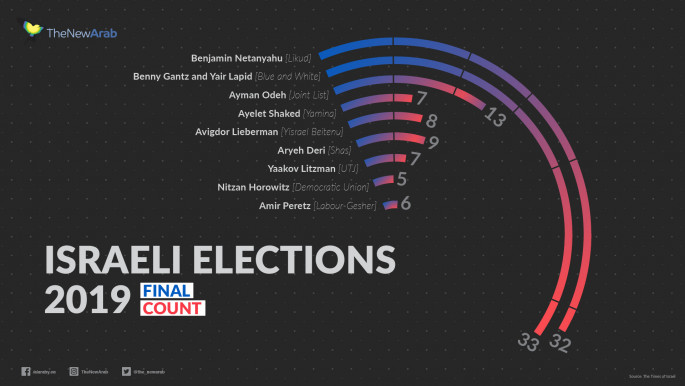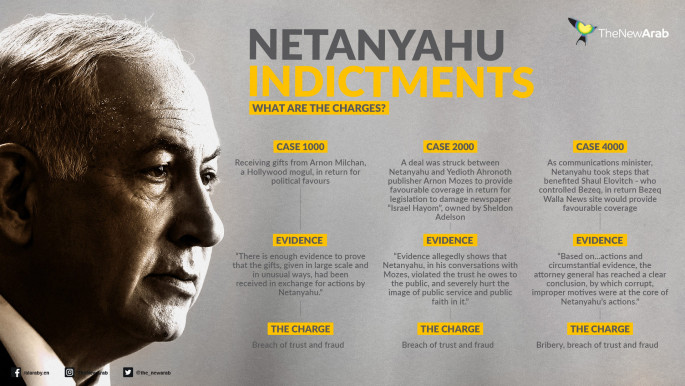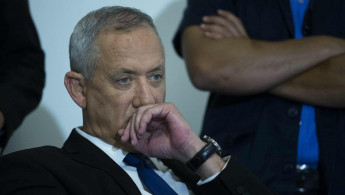Gantz rejects Israeli president's co-premiership offer
Netanyahu, who was tasked Wednesday by Rivlin with forming a new government after last week's deadlocked polls, had reportedly accepted the model of two prime ministers in parallel.
But Gantz's rejection meant a unity government between Netanyahu's Likud and Gantz's Blue and White was out of the question.
Netanyahu must now begin the daunting task of trying to cobble together a coalition government.
After negotiations between the two parties stalled, Rivlin gave Netanyahu the go-ahead after meeting Wednesday with him and ex-army chief Gantz, whose alliance secured one more seat than the premier's Likud party in September 17 elections.
Rivlin outlined his failed proposal, in which the government would be split evenly between the two sides, in a speech the same evening.
He suggested the vice prime minister role, which would have been taken up by Gantz, would be expanded upon the suspension of the prime minister.
 |
Rivlin didn't mention the corruption charges looming over Netanyahu but hinted at the vice prime minister taking over the duties of the prime minister should he be indicted.
When accepting Rivlin's mandate, Netanyahu again called on his main opponent Benny Gantz to join him in a unity government, but his challenger dismissed the premier's negotiating tactics so far as unserious.
Gantz says he should be prime minister under a unity government since his party finished as the largest, while also insisting he will not serve in a government with a premier facing a serious indictment.
The attorney general has announced his intention to indict Netanyahu on fraud, bribery and breach of trust charges pending a hearing expected for early October.
With a potential corruption indictment looming, many expect Netanyahu to seek immunity if re-elected.
The publication of Rivlin's proposal on the same day Netanyahu was given the go ahead to form a government could indicate, according to Israeli media, an attempt at putting public pressure on both Netanyahu and Gantz.
Israel's election committee published the final election results Wednesday which gave rightwing Likud 32 seats compared to Gantz's centrist Blue and White's 33 in the 120-seat parliament.
Netanyahu has up to six weeks in his attempt to form a government. But as he doesn't have the 61-seat majority needed to establish a government, his odds appear slim.
If Netanyahu fails, President Reuven Rivlin could ask Gantz to try. If he too doesn't succeed, the president could choose another legislator or he could set in motion unprecedented third elections.
Netanyahu had suffered one of the biggest defeats of his political career following April polls, when he failed to form a coalition despite his Likud party and its right-wing and religious allies coming out on top.
Read also: Palestinian Balad Party refuses to endorse 'equally racist' Gantz
He campaigned for the September vote with a combination of divisive populism and attempts to portray himself as a world statesman by talking up his relationships with foreign leaders, including US President Donald Trump and Russian President Vladimir Putin.
True to form, he issued a last-minute pledge to annex the Jordan Valley in the occupied West Bank if re-elected, which many saw as a play for vital right-wing nationalist votes.
That, accompanied by his stated intention to annex Israeli settlements in the wider West Bank, could effectively end any remaining hopes for a two-state solution to the Israeli-Palestinian conflict.
 |
Agencies contributed to this report.
Follow us on Twitter: @The_NewArab





 Follow the Middle East's top stories in English at The New Arab on Google News
Follow the Middle East's top stories in English at The New Arab on Google News
![The UAE is widely suspected of arming the RSF militia [Getty]](/sites/default/files/styles/image_330x185/public/2024-11/GettyImages-472529908.jpg?h=69f2b9d0&itok=Yauw3YTG)
![Netanyahu furiously denounced the ICC [Getty]](/sites/default/files/styles/image_330x185/public/2024-11/GettyImages-2169352575.jpg?h=199d8c1f&itok=-vRiruf5)
![Both Hamas and the Palestinian Authority welcomed the ICC arrest warrants [Getty]](/sites/default/files/styles/image_330x185/public/2024-11/GettyImages-2178351173.jpg?h=199d8c1f&itok=TV858iVg)